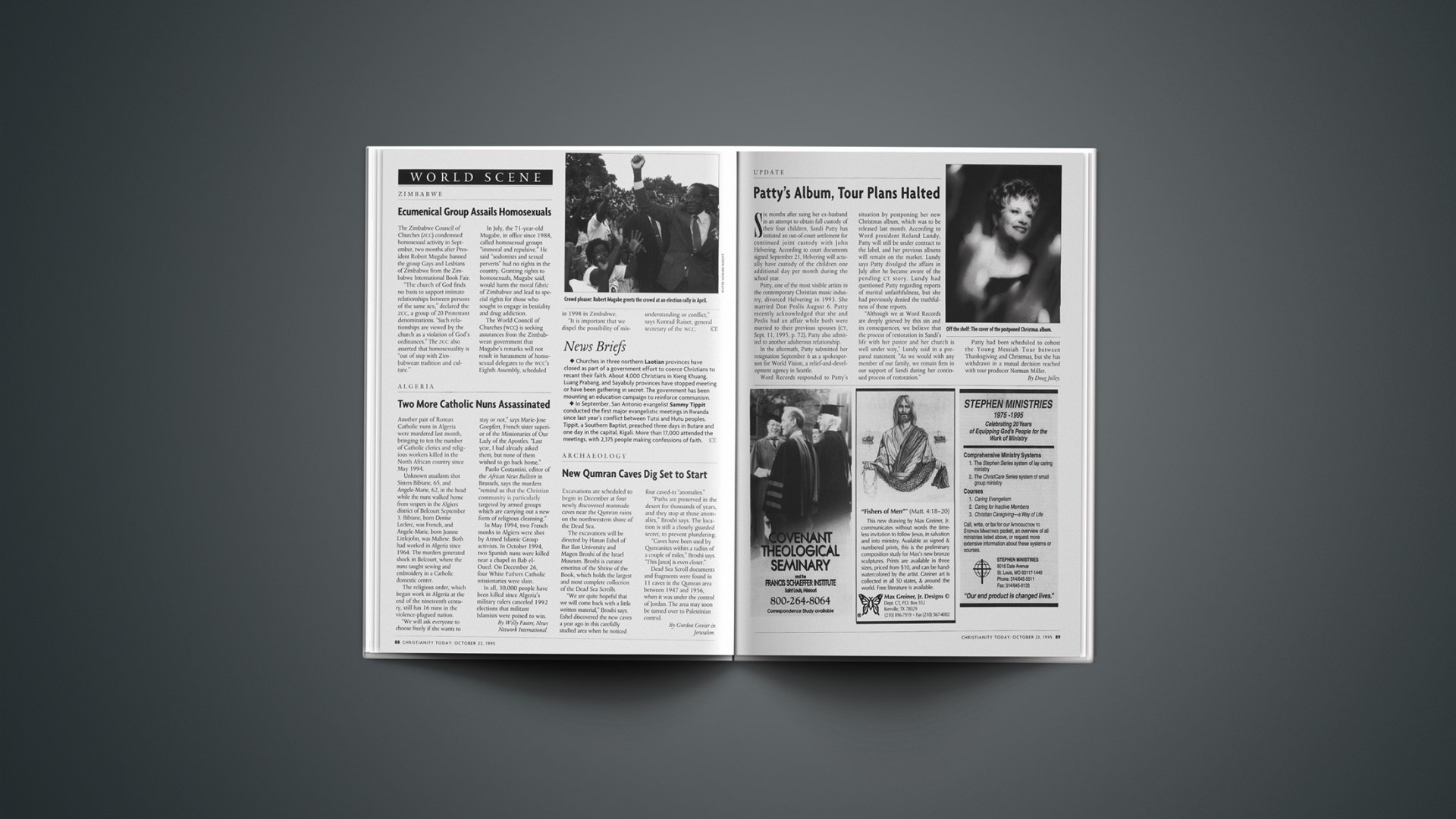ZIMBABWE
Ecumenical Group Assails Homosexuals
The Zimbabwe Council of Churches (ZCC) condemned homosexual activity in September, two months after President Robert Mugabe banned the group Gays and Lesbians of Zimbabwe from the Zimbabwe International Book Fair.
“The church of God finds no basis to support intimate relationships between persons of the same sex,” declared the ZCC, a group of 20 Protestant denominations. “Such relationships are viewed by the church as a violation of God’s ordinances.” The ZCC also asserted that homosexuality is “out of step with Zimbabwean tradition and culture.”
In July, the 71-year-old Mugabe, in office since 1988, called homosexual groups “immoral and repulsive.” He said “sodomists and sexual perverts” had no rights in the country. Granting rights to homosexuals, Mugabe said, would harm the moral fabric of Zimbabwe and lead to special rights for those who sought to engage in bestiality and drug addiction.
The World Council of Churches (WCC) is seeking assurances from the Zimbabwean government that Mugabe’s remarks will not result in harassment of homosexual delegates to the WCC’s Eighth Assembly, scheduled in 1998 in Zimbabwe.
“It is important that we dispel the possibility of misunderstanding or conflict,” says Konrad Raiser, general secretary of the WCC.
ALGERIA
Two More Catholic Nuns Assassinated
Another pair of Roman Catholic nuns in Algeria were murdered last month, bringing to ten the number of Catholic clerics and religious workers killed in the North African country since May 1994.
Unknown assailants shot Sisters Bibiane, 65, and Angele-Marie, 62, in the head while the nuns walked home from vespers in the Algiers district of Belcourt September 3. Bibiane, born Denise Leclerc, was French, and Angele-Marie, born Jeanne Littlejohn, was Maltese. Both had worked in Algeria since 1964. The murders generated shock in Belcourt, where the nuns taught sewing and embroidery in a Catholic domestic center.
The religious order, which began work in Algeria at the end of the nineteenth century, still has 16 nuns in the violence-plagued nation.
“We will ask everyone to choose freely if she wants to stay or not,” says Marie-Jose Goepfert, French sister superior of the Missionaries of Our Lady of the Apostles. “Last year, I had already asked them, but none of them wished to go back home.”
Paolo Costantini, editor of the African News Bulletin in Brussels, says the murders “remind us that the Christian community is particularly targeted by armed groups which are carrying out a new form of religious cleansing.”
In May 1994, two French monks in Algiers were shot by Armed Islamic Group activists. In October 1994, two Spanish nuns were killed near a chapel in Bab el-Oued. On December 26, four White Fathers Catholic missionaries were slain.
In all, 30,000 people have been killed since Algeria’s military rulers canceled 1992 elections that militant Islamists were poised to win.
By Willy Fdutre, News Network International.
ARCHAEOLOGY
New Qumran Caves Dig Set to Start
Excavations are scheduled to begin in December at four newly discovered manmade caves near the Qumran ruins on the northwestern shore of the Dead Sea.
The excavations will be directed by Hanan Eshel of Bar Ilan University and Magen Broshi of the Israel Museum. Broshi is curator emeritus of the Shrine of the Book, which holds the largest and most complete collection of the Dead Sea Scrolls.
“We are quite hopeful that we will come back with a little written material,” Broshi says. Eshel discovered the new caves a year ago in this carefully studied area when he noticed four caved-in “anomalies.”
“Paths are preserved in the desert for thousands of years, and they stop at those anomalies,” Broshi says. The location is still a closely guarded secret, to prevent plundering.
“Caves have been used by Qumranites within a radius of a couple of miles,” Broshi says. “This [area] is even closer.”
Dead Sea Scroll documents and fragments were found in 11 caves in the Qumran area between 1947 and 1956, when it was under the control of Jordan. The area may soon be turned over to Palestinian control.
By Gordon Govier in Jerusalem.
News Briefs
♦ Churches in three northern Laotian provinces have closed as part of a government effort to coerce Christians to recant their faith. About 4,000 Christians in Xieng Khuang, Luang Prabang, and Sayabuly provinces have stopped meeting or have been gathering in secret. The government has been mounting an education campaign to reinforce communism.
♦ In September, San Antonio evangelist Sammy Tippit conducted the first major evangelistic meetings in Rwanda since last year’s conflict between Tutsi and Hutu peoples. Tippit, a Southern Baptist, preached three days in Butare and one day in the capital, Kigali. More than 17,000 attended the meetings, with 2,375 people making confessions of faith.










